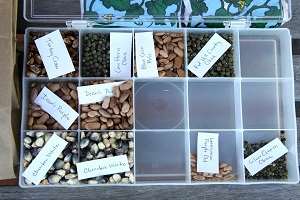By Josh Fuder

Everyone has a seed story. For some of us, it comes from elementary school, where we learned about germination by growing bean seeds in Dixie cups. Many gardeners, however, have built a much deeper, personal connection to seeds by growing and saving seeds that were shared by a parent, grandparent or close friend. To those gardeners, that bean or okra is much more than a plant or ingredient in a delicious summer meal. It’s a connection to the legacy of that plant.
Just like each one of us has a history, every variety of seed has a story. The seeds with the most interesting stories tend to be the ones with the most history. Some varieties can be linked to important historical figures, like Thomas Jefferson. Others bring attention to average gardeners who became stewards of lost varieties, like Merle Van Doren of Missouri, who grew the ‘Moon and Stars’ variety of watermelon, which was believed to be lost.
As the growing season for summer favorites comes to an end, consider saving seeds from healthy, vigorously producing plants and begin a seed legacy of your own. Here are a few tips from University of Georgia Cooperative Extension to follow when saving seeds.
Make sure the seeds are open-pollinated varieties and not hybrids. Hybrids are products of the crossbreeding of two different varieties. Hybrid plants, often mistaken for being “genetically modified,” are bred for traits like vigor, taste, disease resistance or productivity. Hybrid plants, like the ‘Beefmaster’ tomato, produce viable seeds, but the plants will not be reliably similar to the parent plant.
Tomatoes, peppers, beans and okra are great plants for first-time seed savers. These plants have flowers that are self-pollinating and seeds that require little or no special treatment before storage. Seeds from biennial crops, such as carrots or turnips, are harder to save because the plants need two growing seasons to produce seed.
Plants with separate male and female flowers, like corn or vine crops, may cross-pollinate, making it difficult to maintain seed purity. Corn is wind-pollinated, so a stand of sweet corn can be pollinated by a popcorn variety from a neighbor’s crop a mile or more away. Cucumbers, melons, squash and gourds are insect-pollinated and, because they belong to the same family, Cucurbitaceae, they can cross-pollinate if grown close together. This cross-pollination will not affect the fruit this season, but the resulting seed will often have off-characteristics or flavor.
Once you have identified open-pollinated crops, select the most vigorous plants for collecting next year’s seeds. Do not save seed from weak or diseased plants. Some plant diseases can carry over into next year’s garden through the seed.
Beans and okra seeds are easy to save. Simply allow the pods to fully ripen and dry on the plant. This usually occurs about a month after you would normally harvest. If you want to shell them to save the seeds, allow them to dry indoors for two weeks. Many people leave the seeds in the pods until the next growing season.
Tomato seeds are easy to save, but require a little work. Allow the fruit to fully ripen, then scrape the seeds and the mucous into a glass jar with some water. The mixture of water, mucous and seeds will begin to ferment in a few days, which will separate the seeds from the mucous coating. Stir or swirl the jar a couple times per day and the seeds should sink to the bottom within five days. Pour the liquid out, rinse the seeds and spread them out on a paper towel to dry.
Dryness and cool temperatures are key in keeping seeds viable. Store seeds in paper envelopes inside airtight containers or jars. A small amount of silica-gel desiccant added to the container will help keep seeds dry. Refrigeration between 32 and 41 degrees Fahrenheit makes for an ideal storage condition. Label your saved seeds with the name, variety and date of collection.
(Josh Fuder is the University of Georgia Cooperative Extension agricultural and natural resources agent in Cherokee County.)
Source: uga.edu